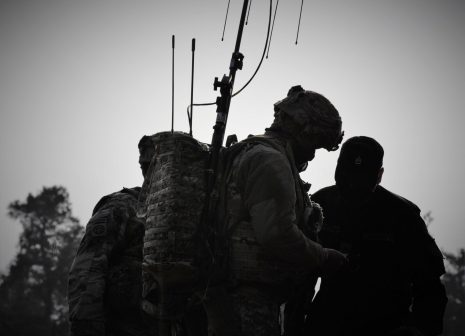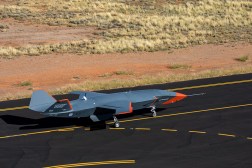AUKUS launching new electronic warfare prize competition, other initiatives

The AUKUS alliance will kick off a new innovation challenge series early next year with an initial focus on electronic warfare, defense leaders from the three nations announced Friday.
Australia’s Deputy Prime Minister and Minister of Defence Richard Marles, U.K. Secretary of State for Defence Grant Shapps and U.S. Secretary of Defense Lloyd Austin, met at the Defense Innovation Unit’s headquarters in Silicon Valley, where the primary focus of their discussions was on advancing Pillar 2 of the trilateral military partnership.
Pillar 2 of AUKUS is geared toward developing and fielding emerging technologies including artificial intelligence and autonomy, advanced cyber, hypersonics and counter-hypersonics, quantum tech, undersea warfare and electronic warfare.
The new innovation challenge falls under that umbrella.
“We have innovation hubs, obviously, in the Defense Department … [that] run prize challenges from time to time, designed to facilitate collecting the best technologies and ideas from the commercial sector with the goal of leveraging those to enhance U.S. military capabilities,” a senior U.S. defense official told reporters on condition of anonymity during a background briefing at the Pentagon ahead of the trilateral meeting and official announcements. “What we’re going to be announcing is doing essentially a trilateral innovation challenge where … each country will release a common innovation prize challenge, and it will be eligible to companies from all three nations. So, it’s illustrative of the way that AUKUS is deepening our ability to innovate together and work together.”
The U.S. and other nations have been moving to boost their offensive and defensive EW arsenals to try to gain an edge and protect themselves against growing threats in the electromagnetic spectrum.
“The first area that we’re focusing on [for the new innovation challenge] is electronic warfare, because we view enhancing our electronic warfare capabilities as critical from the perspective of all of our defense strategies. And it’s an area that we’ve been working together on in AUKUS,” the official told reporters. “I think for the innovation prize challenge, we were really focused on what are areas that our national defense strategies across all three countries identify as important, and … where we are working together in AUKUS, and where we see opportunities for further collaboration. And electronic warfare clearly fits into all three categories. You know, it’s clear that enhancing our capabilities in that arena will be essential on the 21st century battlefield.”
They declined to reveal how much money will be up for grabs for the prize competitions.
“We don’t have anything we’re ready to announce today on the specific dollar amounts involved, other than to say that we think that it will provide important incentives for industry partners from all three countries to contribute ideas to the first challenge focused on electronic warfare … The Defense Innovation Unit has been spearheading some of our efforts in the United States. And so our plan is for the release of the first prize challenge in early 2024,” the official told DefenseScoop at the briefing.
DIU will be overseeing the competition on the U.S. side, according to the official.
They did not disclose what the next focus of the innovation series will be after EW.
“But I think that future topics are likely to, you know, hit some of the same criteria that I just laid out and that capability areas that we’re working on in AUKUS and which are central to all of our national defense strategies,” the official said.
AUKUS leaders are also set to announce other initiatives, including a new series of experimentation and exercises focused on autonomous capabilities in the maritime domain.
“It’s a bold new effort aimed at testing, developing and delivering advanced maritime autonomous systems to our warfighters,” the senior DOD official told reporters during the background briefing.
It will involve a series of integrated trilateral activities aimed at boosting capability development and improving interoperability, the senior DOD official told reporters during the background briefing.
The experiments and exercises will provide additional opportunities for defense companies to participate in technology demonstrations, development and delivery, they noted.
The official suggested the events could include tech that’s similar to what Task Force 59 under U.S. Navy Central Command has been using in the Middle East region. The task force has been using a variety of unmanned systems, sensors and artificial intelligence capabilities to create a “mesh network” for intelligence, surveillance and reconnaissance missions.
The unit also recently successfully tested the ability of a robotic surface vessel to launch a loitering munition and hit its target.
More broadly, the alliance is establishing an AUKUS industry forum with government and industry representatives from the three countries to help inform policy, technical and commercial frameworks to facilitate the development and delivery of advanced capabilities that the nations are pursuing. The first meeting is slated for the first half of next year, according to the official.
The announcements came as the alliance is gearing up to deliver AI algorithms to their militaries in an effort to bolster intelligence, surveillance and reconnaissance (ISR), precision targeting and other mission areas.
The nations have been testing common algorithms on multiple systems, according to the official. As an example, they pointed to the P-8 maritime patrol aircraft. Using the AI technology will allow military personnel to more quickly process large amounts of data from all three nations’ sonobuoys, thereby enhancing AUKUS’ anti-submarine warfare capabilities, they noted.
“In April, we successfully conducted an autonomous swarm demonstration in the U.K. In October, we conducted trials of trusted robotics and autonomous systems in South Australia. Because we’re focused on getting capabilities to the warfighter in AUKUS, we’re integrating these technologies into national programs starting next year, focused first on the land and maritime domains,” the official said.






